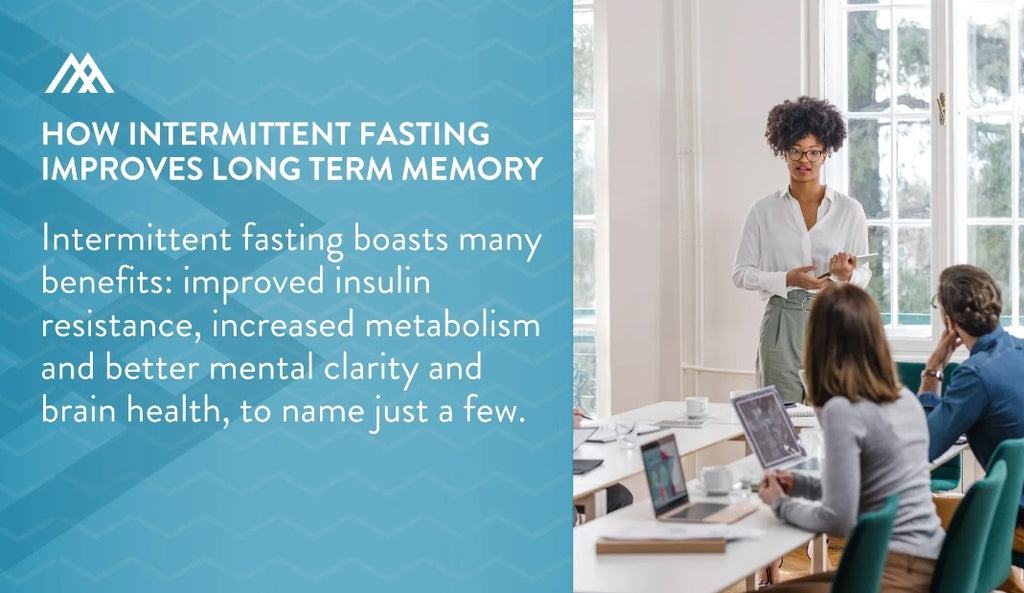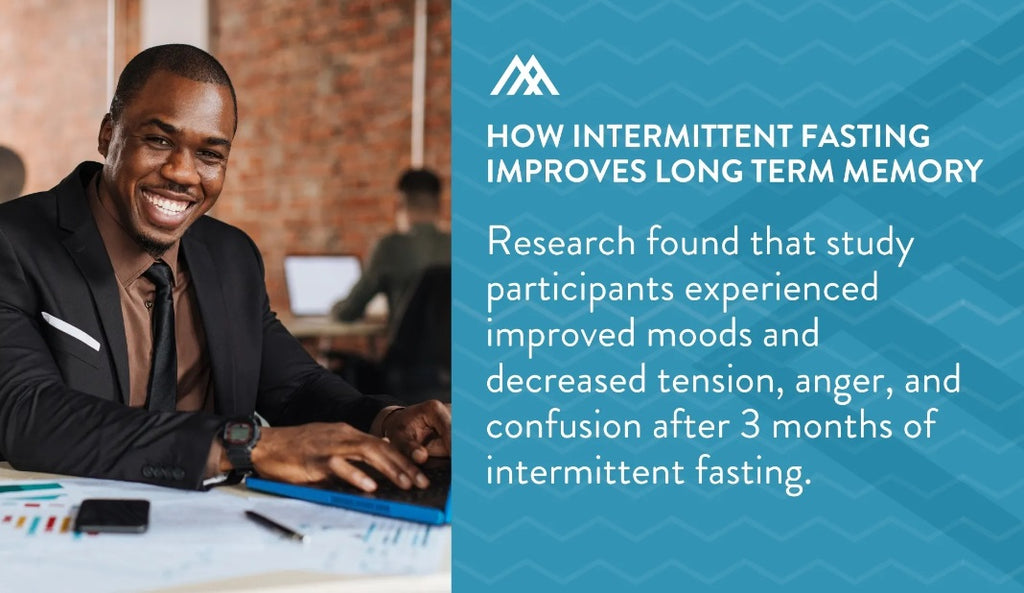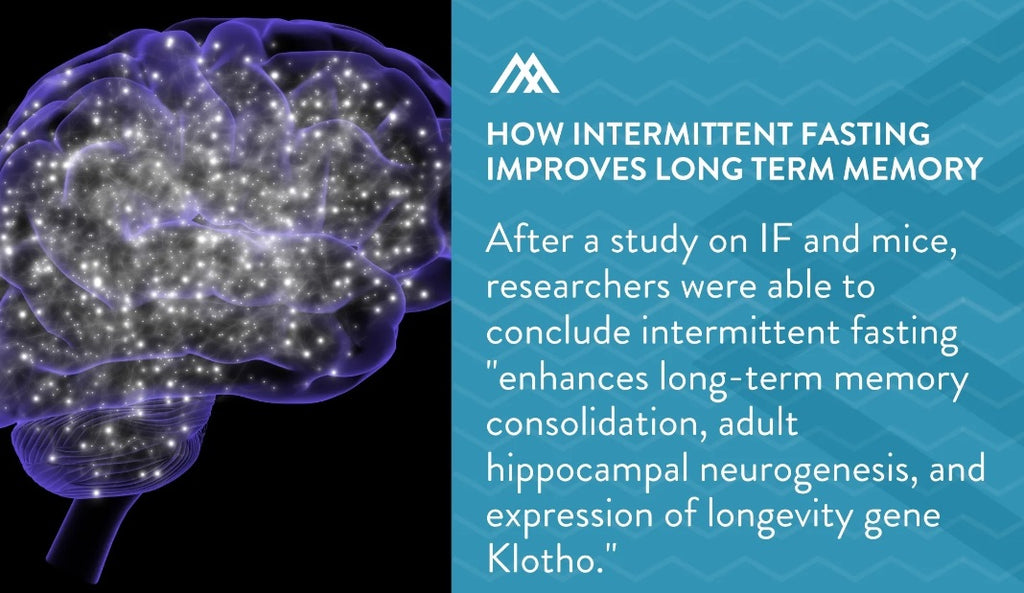Your Cart is Empty

July 19, 2021 5 min read
Take our quiz and find which supplements your body is craving.

Have you ever wondered how the meal "breakfast" got its name? If you break the word down, it literally means to “break a fast,” a period of time without food intake. Short fasts, or intermittent fasts, are built into our schedules. In modern times, the period between dinner and breakfast the next day is the longest fast most of us experience. Our bodies actually thrive during these brief fasting windows. In fact, your brain and body may benefit from adding more short-term fasts to your schedule!
Intermittent fasting (IF) is a more formalized version of the fast between dinner and breakfast or lunch. Though many people view IF as a diet or form of calorie restriction, there really is no "intermittent fasting diet", it's simply an eating schedule. There are many different fasting regimens including:

Typically weight loss is the first benefit that comes to mind when considering intermittent fasting. Though intermittent fasting is not a restricted diet, it does often lead to better calorie control and weight loss. However, the positive effects of intermittent fasting are not limited to regulating your body weight! The benefits of intermittent fasting also include:
Both human and animal studies have found intermittent fasting can improve cognitive function in many different ways:


Intermittent fasting has wonderful short-term benefits as well. Many entrepreneurs, athletes, and celebrities, including Terry Crews, choose intermittent fasting to improve their mental clarity and help them power through their days. Fasting removes a layer of "option overload" from your day and eliminates post lunch lethargy, bloatedness and sugar crashes. In fact, many people feel moreenergized and focused while fasting, almost as if a weight has been lifted. Entrepreneurs in fast-paced environments are turning to IF as a natural productivity booster. In an article at Entrepreneur.com, Cam Secore, a silicon-valley insider and owner of tech review site All Power Moves, stated "numerous tech enthusiasts utilize Kevin Rose's app called 'Zero' to track their fasting. It's free, it works, but it's most useful because it creates accountability."
Kyle Boelte, an author who follows the 5:2 method of IF, also stated "I’ve been intermittent fasting for a year now, and I no longer need an afternoon nap. I’m not irritable if I haven’t eaten in the past couple of hours, which used to happen to me all the time."
Breaking away from the "trap" of the world's 3 meal-per-day system can be scary at first, but many people find it liberating, especially for those who want mental clarity and energy today, and better cognition and memory later in life.
A promising new study found intermittent fasting may also improve long term memory retention.

A study by the Institute of Psychiatry, Psychology and Neuroscience (IoPPN) was conducted on mice at King’s College London. In this study, researchers split female mice into three groups; a control group that received a standard, ad libitum diet of daily feeding, a second group that was on a daily 10% calorie restricted diet, and a third group on alternate-day intermittent fasting diet. After just three months, the brain structure of the mice was evaluated and studies measuring memory loss were conducted. In the end, it was found that mice in the IF group showed improved long-term memory retention compared to the other groups. They were able to conclude that intermittent fasting "enhances long-term memory consolidation, adult hippocampal neurogenesis, and expression of longevity gene Klotho."
So how does IF work for the brain and what do these studies really mean? The hippocampus is known to be crucial for long-term memory. This study highlighted that even when compared to the caloric restrictive group, the mice on the IF diet were found to have enhanced hormone activity in the Klotho gene and more new neurons in the hippocampus, two critical components of slowing and preventing cognitive decline in older people. While researchers Dr. Sandrine Thuret and Gisele Pereira Dias shared that they hope to replicate the study on humans, they noted that just a 10% restriction of calories resulted in a significant difference in long term memory. They believe this shows great promise as a way to slow neurodegeneration and stimulate the production of new brain cells in humans as well.
Intermittent fasting is growing in popularity both in the scientific, and health and wellness arenas. While more studies and clinical trials focused on intermittent fasting's role in preserving human cognition need to be conducted, its short and long-term pay-offs make it well worth a try.
Though many people view IF as a diet or form of calorie restriction, there really is no "intermittent fasting diet", it's simply an eating schedule.
Numerous studies have found IF suppresses neuroinflammation and may be a promising preventative measure against neurodegenerative diseases.
Many entrepreneurs, athletes, and celebrities, including Terry Crews, choose intermittent fasting to improve their mental clarity and help them power through their days.
A promising new study found intermittent fasting may also improve long-term memory retention.

May 29, 2025 10 min read
Learn the benefits of taking collagen at night with Amandean. Support skin, joints, and wellness while you sleep. Shop premium marine collagen today.

April 08, 2025 7 min read
Discover the powerful trio for graceful aging—Vitamin D3+K2 and Omega-3 fatty acids. This dynamic combination supports bone strength, heart health, immune function, and reduces inflammation, helping you maintain vitality and well-being as you age.

March 20, 2025 8 min read
Discover the benefits of creatine for women with Amandean’s Creatine HCI. Improve strength, energy, recovery, and cognitive function with this high-absorption formula. Its advanced HCl form ensures easy digestion and no bloating, providing all the benefits without the drawbacks. Elevate your fitness journey and overall wellness with a supplement designed for women’s unique needs.